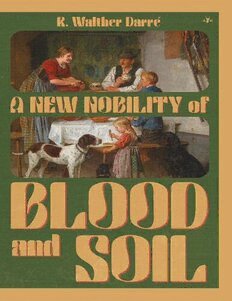
A New Nobility of Blood and Soil PDF
Preview A New Nobility of Blood and Soil
A New Nobility of Blood and Soil A NEW NOBILITY OF BLOOD AND SOIL —R I C H A R D W A L T H E R D A R R É— Translated by A S J S UGUSTO ALAN & ULIUS YLVESTER Foreword by Warren Balogh A N T E L O P E H I L L P U B L I S H I N G English translation copyright © 2021 Antelope Hill Publishing Second printing 2021. Originally published in German as Neuadel aus Blut und Boden by J. F. Lehmanns Verlag, Munich 1930. Translated by Augusto Salan ([email protected]) and Julius Sylvester, 2021. Cover art by sswifty. Cover image: The hunter with his family gathered around the table over supper by Adolf Eberle (1843-1914) Edited by Augusto Salan. Interior formatting by Margaret Bauer. Antelope Hill Publishing www.antelopehillpublishing.com Paperback ISBN-13: 978-1-953730-49-7 Hardcover ISBN-13: 978-1-953730-96-1 EPUB ISBN-13: 978-1-953730-29-9 Dedicated in admiration and friendship to Paul Schultze-Naumburg “There will come a time when it will be recognized that man does not live on horsepower and tools alone. There are also goods which he does not want to and cannot do without. And he will learn to economize, and he will not seek to win one thing, only to lose everything else with it. For if man had gained everything that could be gained with his technology, he would have come to the realization that life on the now disfigured earth—which has been made so excessively easy and simple—is actually no longer worth living; that we have indeed snatched everything that our planet had to give away, and in the process we have destroyed it, and thus ourselves, in this extractive work. Each one of us has to take care of his own part, so that the change may come before it is everywhere too late forever!” Paul Schultze-Naumburg Heimatschutz I: Die Laufenburger Stromschnellen (Homeland Conservation I: The Laufenberger Rapids, Kunstwart) Richard Walther Darré (1895-1953) C ONTENTS Foreword by Warren Balogh Preface I. Introduction II. On The History and Evolution of the German Nobility III. Means and Possibilities for the Formation of a New Nobility IV. Basic Questions of German Agriculture V. The Hegehöfe VI. Outline of the Nobility’s Structure and Governance VII. The Basic Ideas of Breeding Duties and Marriage Laws VIII. Some General Guidelines for the Education of the Young Nobility and for Their Position in the German Nation Appendix A: Recommended Works Appendix B: Glossary of Cited Figures
